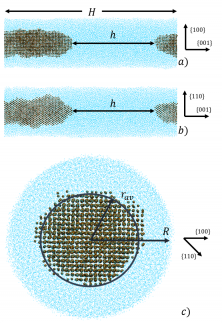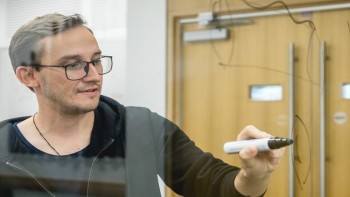Bridging the divide between theoretical and experimental physics
22 February, 2022
Fresh from a second year of working on COVID modelling with Associate Investigator Professor Shaun Hendy, Dr Kannan Ridings from Rongowhakaata is himself one of the MacDiarmid Institute’s newest Associate Investigators, having recently taken up a lectureship in physics at the University of Auckland.
With strengths in mathematical modelling and computer simulation, Dr Ridings is used to working with theory on a range of problems – from the COVID modelling he has recently been involved with, looking at the way the disease spreads across networks of people, to the work simulating the thermodynamic stability of nanowires that he focused on previously in collaboration with Shaun Hendy.
“The nanowire work was based on the use of classical molecular dynamics, which can study larger systems at the expense of accuracy. We can alternatively use quantum mechanical methods that can describe the fine details of the electronic structure of a material with great accuracy, but this comes at the expense of the size of the system you can study.”

A surface melted nickel nanowire where the solid (dark points) have become unstable with respect to the melt (light points).
Dr Ridings is now keen to engage with the Institute further to leverage his previous experience working on metal nanowires, and on networks of COVID spread, to study nanowire networks. This work aligns closely with the goals of the Institute’s new Materials for Low Energy Computing research programme, where for example Principal Investigator Dr Natalie Plank, experimental physicist and Senior Lecturer at Victoria University of Wellington, is looking at the electronic transport properties of silver and zinc oxide nanowire networks.
“I am keen to help bridge precise electronic structure calculations, and the experimental results from the lab. Our theory can help experimentalists understand deeply the phenomenon they observe in the lab. Then what they see in their labs gives us insights into the theory. It’s a really positive feedback loop.
"That’s where the best science will come from."
Actively involved in the Tuakana Programme at the University of Auckland, Dr Ridings is passionate about training the next generation of role models for Māori and Pasifika students.
If you can see someone else with your background, you can see your future.
Dr Kannan Ridings Associate Investigator
He cites the influence of Nobel laureates in growing science in their countries.
“I remember reading about the influence Niels Bohr and Hideki Yukawa had on their countries. Physics in Denmark and Japan were not well established in the early 20th century, but both of these scientists won a Nobel prize early in their careers. This put them into the public eye and inspired a generation of physicists.”

New Associate Investigator, Dr Kannan Ridings from Rongowhakaata
Dr Ridings is passionate about seeing more Māori and Pasifika researchers being a part of the MacDiarmid institute and the scientific research space of Aotearoa. “People need role models. If you can see someone else with your background, you can see your future, you can feel that they’re relatable.”
“I like the direction of research development within Mātauranga and the active encouragement and inclusion of Māori and Pasifika in the sciences within the MacDiarmid Institute. It’s a privilege to be part of.”


